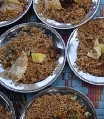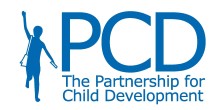 News
News  The Gambia - HGSF Making it Work!
The Gambia - HGSF Making it Work!
 Besides the opportunity to learn, children look forward to two things at the beginning of a school year in the The Gambia: reuniting with friends and the daily hot meals that WFP provides to more than 100,000 children, thanks to the European Union.
Besides the opportunity to learn, children look forward to two things at the beginning of a school year in the The Gambia: reuniting with friends and the daily hot meals that WFP provides to more than 100,000 children, thanks to the European Union.
FARAFENNI – Just outside the back gate of Yalal-Ba Lower Basic School is an empty piece of land: the school farm, which unfortunately could not be cultivated during this cropping season due to lack of rain. This area of The Gambia, the North Bank region, is amongst the most food-insecure and vulnerable areas in the country. Drought has been chronic, especially during the last two years. Malnutrition is prevalent, with rates above 10 percent. WFP provides daily mid-morning meals to students between the ages of 4 - 14 made of rice, salt, peas and oil. Beneficiaries under the school feeding programme are also supported through school gardens, which serve as a learning centre and also a source of vegetables and fruits to supplement the children’s diet.
Local participation
Collaboration with the local community and other organizations is important for WFP’s success. The Ministry of Basic and Secondary Education is striving to create a National School Feeding Policy and working towards local procurement. Teachers work to educate their students, and smallholder farmers work hard to meet the requirements to sell locally grown commodities to schools. School meals are also a source of income for local women, including Fatou Bah.
“When I am not working on my field where I grow rice, maize and a few vegetables, I am at the school cooking for the children,” said Fatou, a cook at Yalal-Ba Lower Basic School.
Fatou wakes up every morning at 5:00 am and walks several kilometers to the school, where she and two other women prepare the students’ daily lunches. They serve up to 187 children daily.
This year, each parent committed to giving the school a bundle of millet.
“The millet will be prepared for the children, but some of it will be dried and used as seeds for the next cropping season,” explained Musa Jallow, the school’s garden master and grade one teacher. Millet is a good source of micronutrients, which will enrich the daily meals. Local participation is not a new facet of the programme, however: in addition to providing school children with locally-produced food, communities also assist in school gardening and the day-to-day management of school feeding.
Fighting hunger…
High food prices and the lingering effects of a severe food insecurity crisis in 2012 have given new importance to school feeding as a vital means of social protection. Nationally, two thirds of households face food insecurity. Giving children meals at their schools encourages poor families to send their children to the classroom—and keep them there.
“When there is food in school, the children stay at school ... Most times there is little or no food at all at their homes,” said Fatou.
In addition to combating hunger, school feeding also complements educational opportunities. Studies show it is difficult for children to learn without adequate food and nutrition.
“School meals make our work easier. When there is food the children come to school willingly and participate actively in class.” said Jallow.
Towards sustainability…
In efforts to work with the Government towards sustainable school feeding programmes, WFP prioritized advocacy and community engagement in 2014. From trainings with farmer organizations on procurement procedures and standards, to drafting policy and sharing best practices from other countries’ school feeding experiences, the locally driven school meals programme is picking up steam.
In line with the new home grown approach to school feeding, WFP and the Government, through the Ministry of Basic and Secondary Education, procured over 60 mt of rice from smallholder farmer groups to feed schoolchildren in 2014. In 2015, local procurement will be expanded to cover other locally grown commodities such as beans, millet, maize, and findi, in line with local preferences in each region.
- Original article from Europa EU
